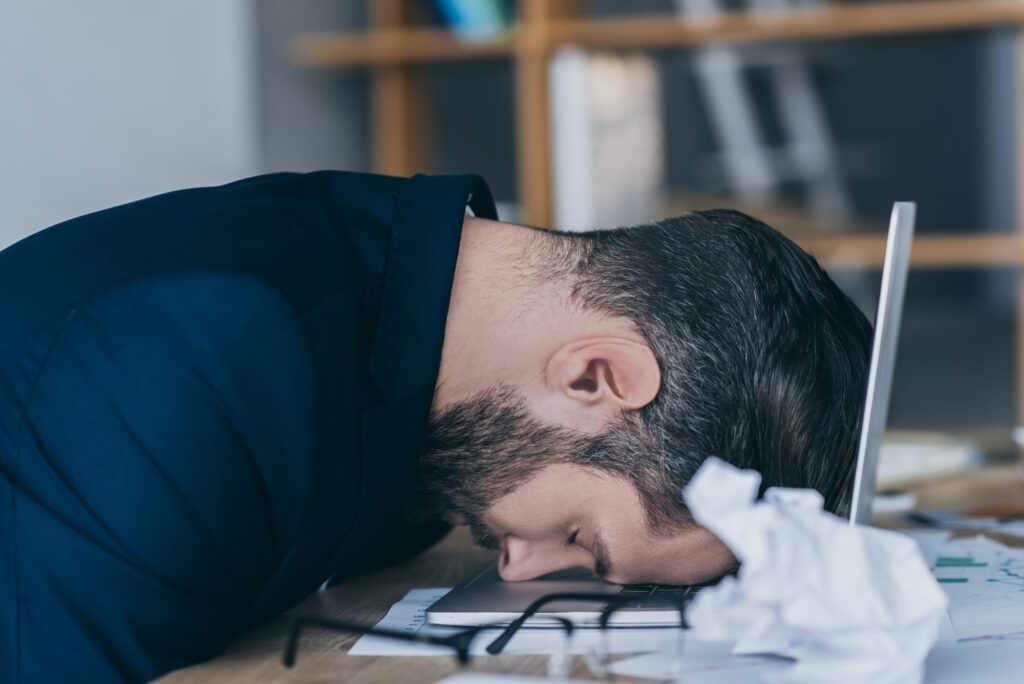
Stress and addiction vulnerability are closely linked, with stress considered one of the main risk factors for substance use disorders. It’s also a leading cause of drug relapse. People who demonstrate addictive behavior often report turning to drug-seeking behavior or relapsing following stressful life events. They also show higher levels of stress hormones due to stress being a physical as well as a mental state.
What’s more, people with mental health disorders are thought to feel more rewarding effects from addictive drugs and alcohol. In this article, you’ll learn about the connection between stress and drug addiction, relapse and what’s going on in the body. First, let’s take a look at 15 ways to cope with stress and substance abuse disorders.
15 Coping Strategies for Stressful Events and Addictive Behaviors
While stress isn’t a mental health disorder, it can cause them and is connected to mental illness in a number of ways. Taken to the furthest extreme when combined with acute or chronic trauma, it can lead to post-traumatic stress disorder.
No matter how intensely you’re experiencing stress, the following methods can help you gain more control over your stress responses and avoid compulsive drug seeking or relapse.
1. Set Short- and Long-Term Goals
When it comes to recovering after exposure to prolonged stressors or any type of stressful stimuli and avoiding drug abuse, it’s vital to set short- and long-term goals. Having a sense of purpose and something meaningful to focus your mind on is the best way to move past stress and carve out a new path for yourself.
Start small, with easily achievable, self-care focused micro-goals. Once you’ve mastered them, gradually work up to bigger objectives.
For example, you might start with:
- Brushing your teeth twice a day every day
- Taking a 10-minute walk every day
- Cutting down the amount of processed food you eat each day
- Practicing meditation or mindfulness for five minutes every morning
Once you feel comfortable and confident doing small things to take care of yourself each day, you can move onto bigger objectives, such as:
- Getting a qualification or gaining experience in a field you’ve always dreamed of working in
- Learning to master an athletic pursuit
- Starting a business to help other people reach their potential
- Working toward earning a certain amount of money each year
- Making a career out of your hobby
- Setting up a podcast
- Learning to play an instrument so you can join a band
Remember, achieving your goals, managing stress exposure and avoiding addiction requires you to take good care of yourself. Many people who are stressed suffered adverse life events during childhood and never learned how to take care of themselves properly, or they were brought up to not feel worthy of self-care. Breaking through this barrier and getting into healthy habits is the foundation of relapse prevention and thriving in the face of repeated stress.
2. Get Into Healthy Daily and Weekly Habits
To reach your goals, you need a foundation of daily and weekly habits that slowly but surely move you forward. This sense of progress and achievement is a direct counter to stress — but only if you start small and slow. Trying to make too many changes at once could simply lead to more stress and lack of adherence and harm self-esteem.
The information below guides you through the most important elements to include in your daily and weekly routine. And while everyone’s recovery journey looks different, with varying priorities and preferences, the following are best practices for anyone looking to manage chronic stress and addiction.
3. Get Therapy
First and foremost, it’s essential to get therapy if you feel you can’t cope with your feelings. Even if you don’t consider that you’ve fallen into depression and/or anxiety, talking through problems with a licensed professional is the best way to prevent stress from escalating into something that harms your ability to function.
A therapist can help you learn more about setting goals and getting into a healthy routine to manage stress.
4. Track Progress Without Judgment
As you set yourself small goals and develop a daily and weekly routine, you’ll need to track your progress. Trying to keep it all in your head makes it harder to be consistent and maintain your routine. Instead, use an app or write down a simple checklist to track habit and goal progress each day. Every week or two, assess how many times you completed each day, add it up and take note of the life events that led to better or worse adherence.
And it’s crucial that you keep in mind that no one is perfect. Even the highest achievers and most successful people in the world aren’t hitting every single target, every single day. Aim to stick to your routine most of the time, and congratulate yourself every time you show improvement.
Next, let’s get into the practices that have shown immense promise in helping people manage their stress levels and avoid turning to substance abuse.
5. Find a Form of Exercise You Love
Exercise is one of the best ways to regulate how your body responds to stress. When you push your body and increase your heart rate, it induces a small amount of stress. Instead of making you weaker, this minor stressor increases your body and mind’s ability to cope with mental and physical challenges.
You don’t have to become a marathon runner or powerlifter to get the benefits of exercise. Walking, dancing, hula hooping, boxing, yoga and martial arts are all great for beginners, are heaps of fun and help you release stress and tension. And it’s more important that you love what you do enough to be consistent than that you hit a new personal best every time.
6. Learn About Sleep Hygiene
In today’s fast-paced world that’s full of thrilling entertainment and endless opportunities for scrolling, sleep is not prioritized nearly as much as it should be. When you don’t get enough sleep, you starve your body of the time it needs to recover, rebuild and heal. The habits you have before bedtime and when you wake up each morning also play a key role in how you feel each day.
7. Journal Every Day
Many people who struggle with substance abuse issues have difficulty managing their emotions. To effectively manage them yourself, you first need to understand what they are. If you didn’t grow up getting lots of hugs and kisses, with adults asking how you were and meeting your needs, emotions can be confusing and feel impossible to control.
Journaling is an excellent way to start learning about what your emotions are and what makes them feel uncontrollable. This is because when you write down how you feel every day and relate it back to what’s happened, you effectively collect data about yourself. Over time, you can look back and use your journal to identify stressors and triggers.
8. Eat Well
The connection between how we eat and how we feel is a strong one. If you’re stressed, it’s often tempting to turn to the easy-to-prepare processed food that’s all around us. However, these foods often lack the nutrients our body needs to perform at its best. While you might be getting enough calories, you might not be getting the vitamins and minerals necessary for full health.
Including plenty of fresh foods in your diet promotes health and helps you fight stress from within. While everyone deserves a treat from time to time, making the majority of your diet treat foods puts unnecessary strain on your body and mind.
9. Develop a Mindfulness and Meditation Practice
Meditation and mindfulness were once thought of as the reserve of new age practitioners. However, science provides evidence that both are highly effective stress management methods. They put the body and mind into a deep state of relaxation, helping you learn how to stay focused on the present moment and not get overwhelmed by thoughts of past, future or anything else you can’t control.
13. Avoid Triggers
It seems like an obvious one, but avoiding triggers is a core component of stress management. By working with a therapist and journaling, you can learn what your triggers are and take steps to avoid them as much as possible. Of course, there are many stressful elements of life we can’t control, but learning about the ones you can is a huge step in the right direction.
Note that not all triggers necessarily stem from negative life events. For some people, success or self-improvement can be a trigger. Knowing what sets off stress and addiction for you gives you a head start in not letting it harm your health.
14. Connect With Others
The importance of connecting with others can’t be overstated. As humans, we are some of — if not the most — social creatures on earth. We’ve evolved to rely on each other, and lack of social connection is a leading cause of stress. If you’re confident socially, be sure to pursue hobbies and pastimes that involve interacting with others, and don’t be shy about making friends.
On the other hand, if you struggle socially, you can find connection through internet forums, literature, songs and online communities and fan bases. No matter how you connect with other people, it’s valid and incredibly important for preventing stress and substance abuse.
15. Never Be Afraid to Seek Help
Last but by no means least, don’t be afraid to tell those around you when everything feels too stressful. Holding negative feelings in can be very harmful, encouraging them to grow and take root. Speaking to people and telling them we’re struggling is often the release necessary to find a new perspective and start trying to overcome the problem instead of getting overwhelmed by how it makes you feel.

What Is Stress?
Stress is a physical and mental response to feeling threatened or under pressure and tends to rear its head in situations we feel unable to manage. There are a billion causes for stress, and what might be stressful for one person could be seen as insignificant to someone else. Generally speaking, there are four types of stress:
- Individual: When you feel unable to manage your responsibilities
- Group: If your family is experiencing financial issues or loss
- Community: Being part of a group that’s facing discrimination
- Social: Following natural disasters or pandemics
In small doses, stress can actually be beneficial — as with exercise, the thrill of working hard or the feeling of hitting a difficult personal goal. However, intense stress that lasts a long time is quite literally toxic to the body.
The Connection Between Chronic Stress and Addiction
There’s no single cause of addiction. For people who struggle with the condition, a number of genetic, environmental and personal factors are combined — and chronic stress is a common risk factor.
People who are susceptible to addiction tend to have a lower threshold for emotional pain and find it harder to self-regulate. In these cases, stressors that many people might easily be able to cope with can be unbearable for the susceptible individual. And an effective short-term way to manage out-of-control emotions is by numbing them though substance abuse. However, long-term drug abuse causes far more harm than good and ultimately makes it even harder to manage stress.
Early Life Stress and Drug Abuse
If you regularly experienced stress as a child, you might have chronically elevated stress levels. Lots of people who experienced trauma during their formative years have trouble regulating their emotions in adulthood and tend to be more sensitive to stress. This makes them more likely to turn to drugs or alcohol.
Thankfully, addiction and mental health treatment can help you learn techniques to reduce stress levels and bring your body into a state of calm. Combine treatment with the techniques listed above and you can effectively reduce stress. When you know how to regulate stress levels, you’re less likely to progress into an emotional state that triggers substance use.
Change Your Life With Substance Abuse Treatment
If you’ve been self-medicating with drugs or alcohol to cope with stress, help is at hand. At Behavioral Health Centers, we support you as you learn the coping mechanisms necessary to manage stress and take control of your future. Call today at 844-797-0426 to learn more about our progressive recovery process.







